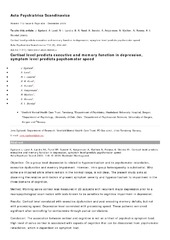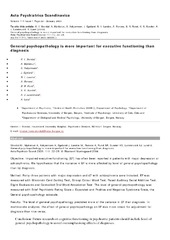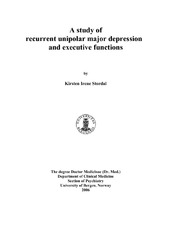| dc.description.abstract | Background: Unipolar major depression is a prevalent disorder and is in the World Health Organisation’s (WHO) top five on their global burden of disease-list. For more than three decades, assessment of neurocognitive functioning in patients with mental disorders by use of neuropsychological tests has been performed for research purposes. Patients with schizophrenia have been extensively studied, but a substantial amount of research has also been performed on depressed patients. In patients with unipolar major depression, performance below that of healthy controls has been shown on tests measuring memory, attention, psychomotor speed and executive functions. Executive Functions (EF) are higher order neurocognitive functions that control and integrate other neurocognitive functions; dysfunctions have been associated with frontal lobe dysfunction. Still, there is a lack of studies investigating EF in the most prevalent form of unipolar major depression, patients with recurrent subtype. This thesis is based on four original research papers published in referee based international journals. In paper I, we question whether executive dysfunctions also are present in patients with recurrent unipolar major depression compared to healthy controls. The investigation includes pattern and severity of executive dysfunction. In paper II, we consider whether all patients with recurrent unipolar major depression have impairment of EF. Mental disorders can be regarded as both categorical and dimensional conditions: according to the continuum model unipolar major depression and schizophrenia can be viewed as different levels of general psychopathology (LGP). Paper III explores the continuum model of mental disorders. We investigate whether LGP explains more of the variance in EF than diagnosis (unipolar major depression versus schizophrenia). Elevated levels of the stress hormone cortisol are often found among depressed patients, and there is evidence that prolonged hypercortisolemia can be neurotoxic. Specifically, recurrent depression episodes may lead to progressive brain damage. It is uncertain if executive dysfunctions in recurrent unipolar major depression are associated with elevated cortisol levels. Therefore, the aim of paper IV was to explore whether level of saliva cortisol is correlated with level of executive dysfunctions in recurrent unipolar major depression. Method: Data were collected in the context of a Norwegian, cross-sectional, multi-centre study, the BOP, starting in 1998. In the BOP, patients with either a diagnosis of unipolar major depressive disorder (MDD), recurrent type (N=50) or schizophrenia (N=53) and healthy controls (N=50) were included. The patients were diagnosed by the Structured Clinical Interview for DSM-IV Axis I Disorders. Depressed patients scoring above 18 points on both the Hamilton Depression Rating Scale and Montgomery-Åsberg Depression Rating Scale were included. Other inclusion criteria were: age between 20 and 50, Norwegian language and normal vision and hearing. Patients were excluded if they had a history of head trauma, neurological disorder or developmental dysfunction, present alcohol or substance abuse, other medical conditions likely to affect neurocognitive functions or if they recently had received electro convulsive treatment. The clinical psychiatric evaluation was performed by five trained psychiatrists. In the BOP, a broad neuropsychological test battery was used to measure several domains of neurocognitive function. In this thesis, mainly tests assessing components of EF are used. The tests were administered by a licensed clinical neuropsychologists, a graduate psychology student or a medical doctor (Kirsten Irene Stordal) supervised by a neuropsychologists. Results: There was a tendency for patients with recurrent MDD to perform below healthy controls on all measures of EF (Paper I). A significant group difference was found for eight of ten measures. The executive dysfunctions were within -1.0 SD from the mean of the control group. While the components verbal fluency, inhibition, set-maintenance and working memory were affected in recurrent MDD, set-shifting and planning seemed to be spared. Whether this dysfunction could be found in all patients with recurrent episodes of depression, was uncertain. This was explored in the following paper, the result being that more than half of the patients with recurrent MDD had unimpaired EF when unimpairment was defined as performance above -1.0 SD of the sample mean of the control group on more than one component of EF (Paper II). The sub-group of patients without impairment of EF was characterised by higher intellectual abilities and fewer episodes of depression than the subgroup with EF impairment. In paper III we found EF impairment to be more strongly related to LGP than to diagnosis (MDD versus schizophrenia). In the last paper an inverse correlation between saliva cortisol and EF was found (Paper IV). Discussion: All the papers add to current knowledge in this field: The first paper in that patients with recurrent MDD have mild executive dysfunctions, and that seemingly all components of EF are affected. The second paper shows that more than half of patients with recurrent MDD have unimpaired EF when depressed, and that this subgroup has higher intellectual abilities and a history of fewer depression episodes. The novel finding in the third paper is that EF impairment is more strongly related to LGP than diagnosis (comparing MDD and schizophrenia). This finding is in line with the continuum hypothesis in psychiatry. In recurrent MDD, the level of performance on tests assessing EF seems to be inversely correlated with the level of saliva cortisol. Thus, this fourth study directly and indirectly gave support to the cortisol hypothesis. There is little evidence that unipolar major depression is uniquely associated with executive dysfunctions due to that 1) most components of EF are affected, 2) not all patients have executive dysfunctions, 3) executive dysfunctions are not specific to depression as they are also found in other mental disorders and in somatic disorders and 4) not all depressed patients have elevated levels of cortisol associated with executive dysfunctions. Future studies of the association between mental disorders and neurocognitive dysfunction should avoid restrictions resulting from imperfect diagnostic classifications for mental disorders, i.e. focusing on similarities in neurocognitive dysfunctions across psychiatric diagnoses rather than within one mental disorder at the time. | en_US |




